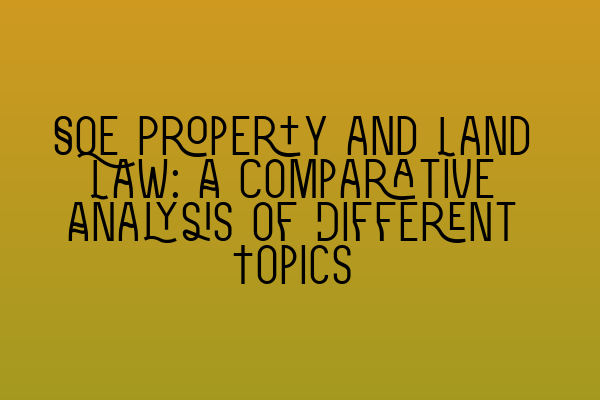SQE Property and Land Law: A Comparative Analysis of Different Topics
Welcome to SQE Property Law & Land Law, where we aim to provide you with comprehensive insights into the world of property and land law. In this blog post, we will undertake a comparative analysis of various topics within this field, shedding light on key differences and similarities that every solicitor, aspiring solicitor, or property enthusiast should know.
1. Freehold vs Leasehold: Understanding the Basics
When dealing with property, one of the first distinctions to consider is the difference between freehold and leasehold. In this article, we will explore these two forms of property ownership, outlining their unique characteristics and legal implications. Whether you are a buyer, seller, or investor, it is crucial to understand the nuances of freehold and leasehold to make informed decisions. Learn more about freehold and leasehold by clicking here: SQE 1 Practice Exam Questions
2. Easements and Restrictive Covenants: Balancing Rights and Obligations
Easements and restrictive covenants play a vital role in determining the rights and obligations associated with a property. In this section, you will gain an in-depth understanding of these legal arrangements and how they impact the use and enjoyment of land. Whether you are dealing with a right of way or a restrictive covenant that affects your property, it is essential to be well-versed in this area of property law. Dive deeper into easements and restrictive covenants by clicking here: SQE 1 Practice Mocks FLK1 FLK2
3. Adverse Possession: The Intricacies of Claiming Ownership
Adverse possession is a concept that often sparks curiosity and debate. This principle allows someone to acquire legal ownership of a property by occupying it without the owner’s consent for a certain period of time. In this section, we will delve into the intricacies of adverse possession, exploring its requirements, limitations, and potential implications. If you want to understand the ins and outs of adverse possession, click here: SQE 2 Preparation Courses
4. Registered vs Unregistered Land: Unveiling the Differences
The distinction between registered and unregistered land is crucial when dealing with property transactions. In this part, we will uncover the differences between registered and unregistered land, focusing on the implications for buyers, sellers, and lenders. Understanding the registration process and the benefits of registration is vital to ensuring a smooth and secure property transaction. Get a clearer picture of registered and unregistered land by clicking here: SQE 1 Preparation Courses
5. Property Disputes: Resolving Conflicts Professionally
Property disputes can arise in various contexts, from boundary disputes to disagreements over rights and responsibilities. As a solicitor, it is crucial to know how to handle these disputes effectively. In this section, we will discuss different types of property disputes and the available legal remedies for resolving them. Equip yourself with the knowledge and skills needed to navigate property disputes by clicking here: SRA SQE Exam Dates
In conclusion, SQE Property Law & Land Law offers comprehensive insights into the intricacies of property and land law. By understanding the key differences and similarities in various topics, solicitors and aspiring solicitors can navigate this complex area of law with confidence. Stay tuned for more informative articles that will broaden your understanding of property law and help you excel in your legal career.
Thank you for choosing SQE Property Law & Land Law as your go-to resource for property and land law expertise.
